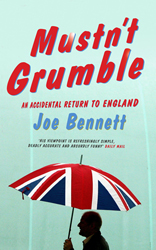Mustn't Grumble by Joe Bennett
(Simon & Schuster), Pp. 280
Joe Bennett lives in
Christchurch, New Zealand where he writes columns for syndicated newspapers and
books of witticisms and comment. In the introduction to this book he writes, “I
am English, but I have spent most of my adult life abroad. When a publisher
asked me if I would like to come back, travel around England for a bit and
write a book about it, I said yes.” Well, who wouldn’t? Inspired by the 1927 work
of H.V. Morton, In Search of England,
he decides to follow his footsteps, but by hitch-hiking his away around the
country. He soon falls out of love with both Morton and the attempt to
hitch-hike as he finds no one stops.
Although he has lived abroad for
nearly 25 years, Joe Bennett still identifies with his home country. “I remain
English and will die English. And I am happy with that. In a primal way over
which I have no control, I still love the place.” He relishes peculiarities and
idiosyncrasies, from the way accents indicate class as much as regions, to the
courtesy of motorway driving (he borrows a friend’s Audi to tour the country)
or “the remarkable ability of the English to eat ice cream in chilly weather.”
He even enjoys the climate, the delight in bemoaning which lends his book its
self-deprecating title.
Most of his daily excursions finish
at the pub. “I am often asked if there is anything I miss about England. There
isn’t. I have lived so long abroad that I don’t yearn. If I did, I’d come back.
But there are some things that I relish when I do come back and one of those is
pubs.” He is definitive about what constitutes a good pub. “People come in to
talk to whoever happens to be there… They laugh a lot. There is nothing that
cannot be discussed... It’s a coincidence of paths, a random intersection of
lives that will never come again. We meet, we laugh, we go away again. I like
that.” As anyone who has left England and returned, he notices the lack of
space and the sense of history and culture, “There are few parts of this
cramped country that have not been written about. It’s going to be hard to
escape literature on this trip. I don’t think I’ll bother to try.”
His attitude is generally
affectionate, but he doesn’t love everything. He dislikes the council buildings
of the 1950s, thrown up in haste and unfortunately permanent. Like many before him,
he bemoans the utilitarian modernity and there is a hint of axe grinding in his
scathing assessment, “Cathedrals strive so hard to deny that they’ve become
theme parks.”
He is a good writer, able to make
the commonplace interesting. Squirrels “ripple across the grass, their spines
undulating like waves along a skipping rope…” While mainly direct, he occasionally
becomes verbose when he warms to a theme, such as when he writes of the lack of
response received at the breakfast table.
Joe Bennett has asked many people
(usually in his pub conversations) what it means to them to be English. While
many are proud to be so, they have struggled to define it. Some can only express
their identity by knowing what it is not, and what it is not is European. (This book was published in 2006; ten years before Brexit). The image of Englishness perplexes him, as he notes that Morton was harking back to an
England he expected his readers to want and so he delivered it to them.
Bennett
is frequently told that the old way of life has changed due to progress and
immigration. He concedes he is in no position to judge whether England is
overrun by migrants, as he has mostly seen the England of the shires. “Yet I
have heard any number of middle-class, middle-aged whites, most of them living
in towns that are ninety-eight per cent white, telling me that immigration is
ruining the country.”
He
soon grows weary of H.V. Morton and his elegiac prose, which he feels is calculating
and was propagandist even when written. Bennett begins to deliberately stray
from Morton and his beaten track because he feels he is being manipulated. “I
don’t want stuff packaged. I don’t want my way to be eased...” He would rather
drop in unexpectedly on places and take them as they are.
He is a curmudgeon who
won’t be patronised. He thinks of himself as a free spirit, wandering the
countryside at will, while most at home propping up the bar and chatting to
strangers without commitments or consequences. He finds humour in adversity and
fascination in mundanity. If H.V. Morton went in search of England, then Joe
Bennett probably found it.







.jpg)
.jpg)
.jpg)
.jpg)
.jpg)
.jpg)
.jpg)
.jpg)
.jpg)
.jpg)
.jpg)
.jpg)
.jpg)
.jpg)
.jpg)
.jpg)
.jpg)
.jpg)
.jpg)
.jpg)
.jpg)


